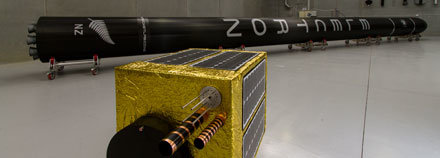
Auckland aerospace company Rocket Lab has taken another step towards its goal of making space more accessible to business with a new launch vehicle set to take off next year.
The vehicle – Electron – is an 18 metre-long rocket capable of carrying 110kg satellites and other payloads into space. It taps into growth at the small end of the satellite market and could make a difference in areas like broadening global internet coverage, helping monitor and optimise crops to feed more of the world’s population, better understand weather conditions and climate change, and provide real time mapping, says CEO Peter Beck.
“What’s really exciting is smaller satellites in large constellations beaming down to the planet,” he says. “Satellites in large numbers are how we can achieve these things and more.”
Electron is designed to slash the cost and time of launch, Beck says. He cites a current average price of a dedicated satellite launch system of US$133 million, with the Electron costing US$4.9 million on average.
It will take weeks instead of years to launch into orbit, weighs more than 10 tonnes and its 18 metre length compares with an average of 60 metres for other rockets, the company says.

Its 25-strong team developed Electron’s hardware from scratch at its Auckland site over the past year and plans the first launch next year.
The vehicle is carbon composite and the propulsion system is fulled by liquid oxygen and kerosene. It breaks up as it goes into orbit and is designed to be expendable, but Rocket Lab will re-use whichever parts it can, says Beck.
The top speed is 27,500 km/hr.
It will also establish a space port in New Zealand, but hasn’t yet decided where.
Rocket Lab expects to quickly turn a profit with Electron, and already has 30 launch commitments and memoranda of understanding, which Beck says is “unheard of” pre-launch. The companies committing to launch payloads range from traditional aerospace giants to Silicon Valley startups, he says.
The Electron venture is backed by a $25 million government grant and investment by US giant Khosla Ventures, which had a representative at the launch. Sir Stephen Tindall’s K1W1 has also invested.
Beck wouldn’t disclose how much Khosla Ventures had invested.
Rocket Lab was the first private company in the Southern Hemisphere to launch a rocket into space with the Atea-1, which took off from Great Mercury Island in 2009. Beck founded the company in 2007.





